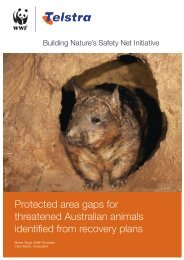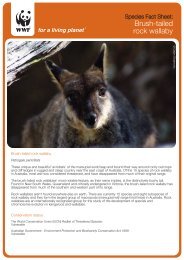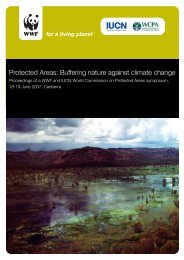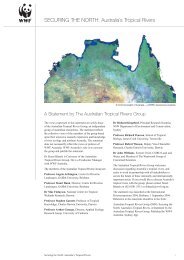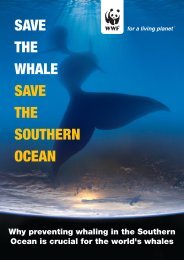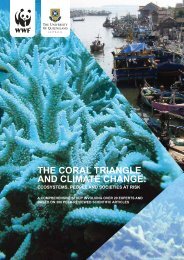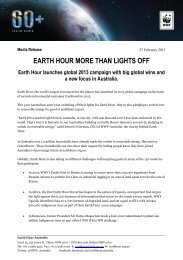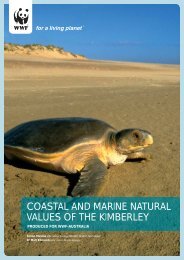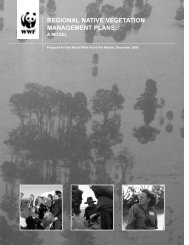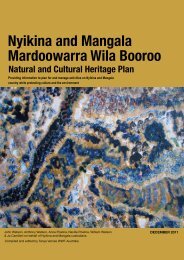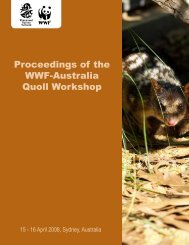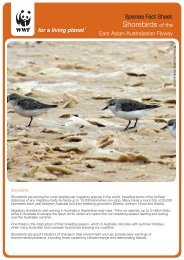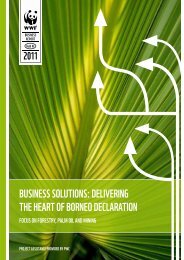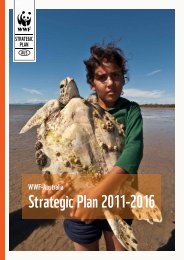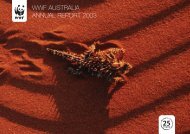Indigenous Peoples and Conservation Organizations
Indigenous Peoples and Conservation Organizations
Indigenous Peoples and Conservation Organizations
You also want an ePaper? Increase the reach of your titles
YUMPU automatically turns print PDFs into web optimized ePapers that Google loves.
152 Annex<br />
8. WWF recognizes that indigenous peoples have the rights to the l<strong>and</strong>s, territories, <strong>and</strong> resources that<br />
they have traditionally owned or otherwise occupied or used, <strong>and</strong> that those rights must be recognized<br />
<strong>and</strong> effectively protected, as laid out in the ILO Convention 169.<br />
9. WWF recognizes the right of indigenous peoples to exert control over their l<strong>and</strong>s, territories, <strong>and</strong><br />
resources, <strong>and</strong> establish on them the management <strong>and</strong> governance systems that best suit their cultures<br />
<strong>and</strong> social needs, whilst respecting national sovereignty <strong>and</strong> conforming to national conservation <strong>and</strong><br />
development objectives.<br />
10. WWF recognizes, respects, <strong>and</strong> promotes the collective rights of indigenous peoples to maintain <strong>and</strong><br />
enjoy their cultural <strong>and</strong> intellectual heritage.<br />
11. Consistent with Article 7 of the ILO Convention 169, WWF recognizes indigenous peoples’ right to<br />
decide on issues such as technologies <strong>and</strong> management systems to be used on their l<strong>and</strong>s, <strong>and</strong> supports<br />
their application insofar as they are environmentally sustainable <strong>and</strong> contribute to the conservation<br />
of nature.<br />
12. WWF recognizes that indigenous peoples have the right to determine priorities <strong>and</strong> strategies for the<br />
development or use of their l<strong>and</strong>s, territories, <strong>and</strong> other resources, including the right to require that<br />
States obtain their free <strong>and</strong> informed consent prior to the approval of any project affecting those<br />
l<strong>and</strong>s, territories, <strong>and</strong> resources.<br />
13. WWF recognizes <strong>and</strong> supports the rights of indigenous peoples to improve the quality of their lives,<br />
<strong>and</strong> to benefit directly <strong>and</strong> equitably from the conservation <strong>and</strong> sustainable use of natural resources<br />
within their territories.<br />
14. In instances where multiple local groups claim rights to resources in indigenous territories, WWF recognizes<br />
the primary rights of indigenous peoples based on historical claims <strong>and</strong> long-term presence,<br />
with due regard for the rights <strong>and</strong> welfare of other legitimate stakeholders.<br />
15. WWF respects the rights of indigenous peoples to enjoy an equitable share in any economic or other<br />
benefits realized from their intellectual property <strong>and</strong> traditional knowledge, building on the provisions<br />
of the Convention on Biological Diversity.<br />
16. In conformity with the provisions of the ILO Convention 169, WWF recognizes the right of indigenous<br />
peoples not to be removed from the territories they occupy. Where their relocation is considered<br />
necessary as an exceptional measure, it shall take place only with their free, prior informed consent.<br />
II. <strong>Conservation</strong> Objectives<br />
17. At the heart of WWF’s work is the belief that the earth’s natural systems, resources, <strong>and</strong> life forms<br />
should be conserved for their intrinsic value <strong>and</strong> for the benefit of future generations.<br />
WWF bases all of its conservation work on the principles contained in its Mission statement.<br />
In addition, WWF fully endorses the provisions about biodiversity conservation <strong>and</strong> sustainable<br />
development contained in the following documents:<br />
• Agenda 21<br />
• Convention on Biological Diversity<br />
• Convention on Trade in Endangered Species of Flora <strong>and</strong> Fauna (CITES)<br />
• Convention on Wetl<strong>and</strong>s of International Importance (Ramsar Convention)<br />
• Caring for the Earth<br />
18. WWF encourages <strong>and</strong> supports ecologically sound development activities, particularly those that link<br />
conservation <strong>and</strong> human needs. WWF may choose not to support, <strong>and</strong> may actively oppose, activities it<br />
judges unsustainable from the st<strong>and</strong>point of species or ecosystems, or which are inconsistent with<br />
WWF policies on endangered or threatened species or with international agreements protecting wildlife<br />
<strong>and</strong> other natural resources, even if those activities are carried out by indigenous communities.



